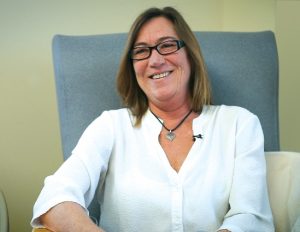“It came from out of the blue,” Diane says. “I thought I was done with my cancer.”
By then, Diane was working in Leonardtown, Md. Her oncologist at nearby MedStar St. Mary’s Hospital sent her to MedStar Georgetown University Hospital, where she would have full access to the latest treatments as well as clinical trials through the Georgetown Lombardi Comprehensive Cancer Center.
“This was a rare disease in a young, healthy person,” says Amir Khan, MD, medical director of Cancer Care and Infusion Services at MedStar St. Mary’s and Diane’s oncologist. “I wanted to have her treatment plan formalized quickly to see if there were other options for her beyond standard therapy.”
Diane met with Louis M. Weiner, MD, director of the Georgetown Lombardi Comprehensive Cancer Center. “Here at MedStar Georgetown, we partner with Caris Life Sciences to perform detailed molecular profiling of patients’ tumors,” says Dr. Weiner. “In Diane’s case, we found the cancer cells were similar to those in clinical trials that have been shown to be sensitive to certain immunotherapy drugs.”
In October 2016, Diane began receiving immunotherapy treatments, for one hour every two weeks for 12 weeks.
“The only side effect I had was a small rash on my belly, but that went away with a course of prednisone,” says Diane. Side effects, sometimes serious ones, occur in fewer than 10 percent of immunotherapy patients.
 Three months later, Diane’s scan showed her liver tumor had shrunk by half, and the lesions in her lung were shrinking as well.
Three months later, Diane’s scan showed her liver tumor had shrunk by half, and the lesions in her lung were shrinking as well.
“My doctors were thrilled, and of course I was too,” says Diane. “And the best part is that I’ve been able to work and live my normal daily life with no pain or fatigue, no hair loss, no nausea or loss of appetite.”
Dr. Weiner says research shows that when immunotherapy works rapidly, as in Diane’s case, the results tend to be more long lasting.
“Diane’s situation is a great example of how MedStar’s network of hospitals, linked with clinical and research priorities, works collaboratively to provide patients access to the latest advances in cancer care,” says Dr. Weiner.
An avid boater, Diane says she’s at the beach and on the water as much as possible. “With this treatment, I’ve been able to continue to make plans to enjoy the things I’m passionate about. My daily life is normal. I don’t think about having cancer. I just keep living my life being very grateful and hoping for continued good news.”

